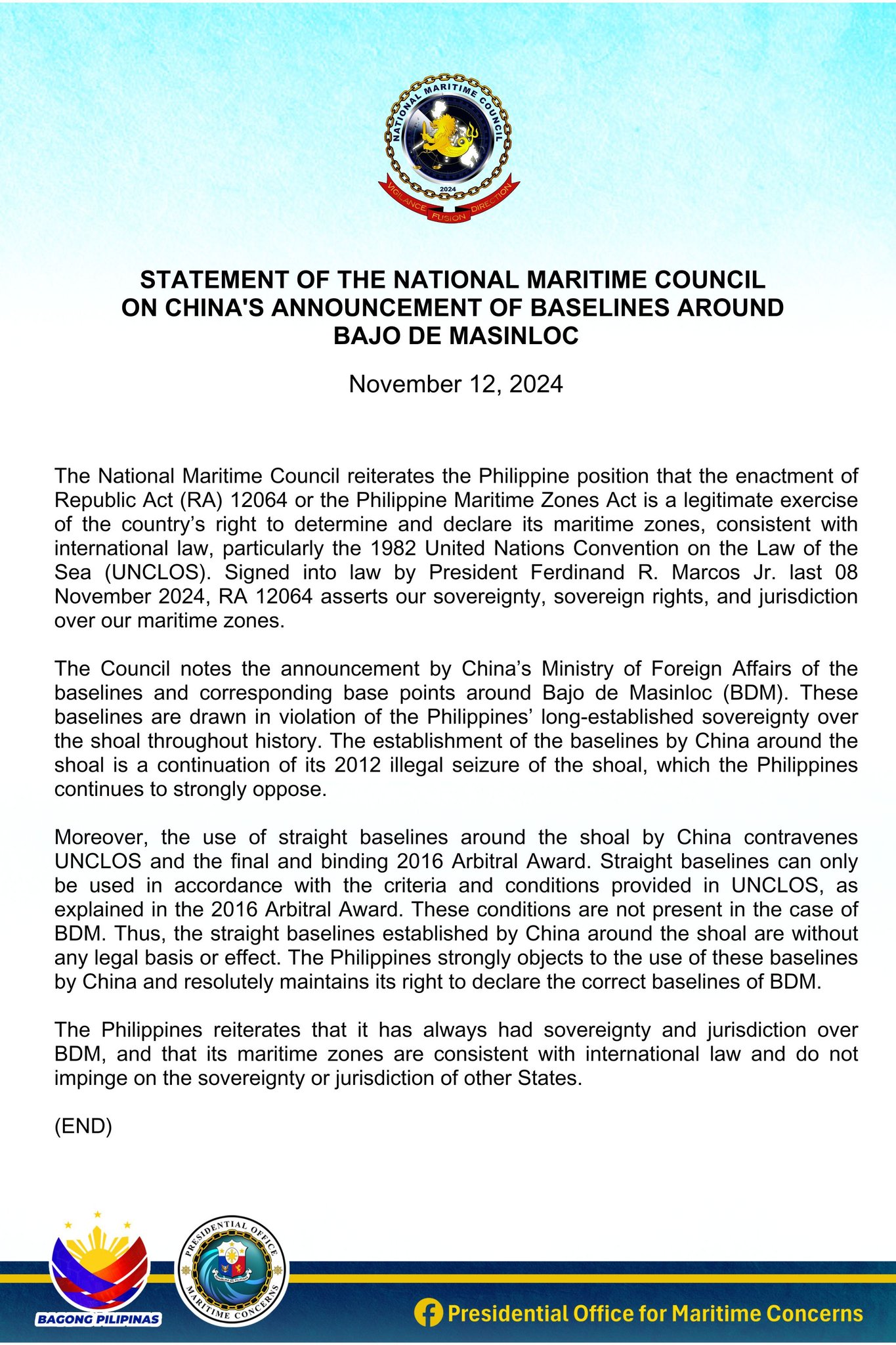

MANILA, Philippines - The Department of Foreign Affairs (DFA) reiterated the Philippines’ position that the “enactment of Republic Act (RA) 12064 or the Philippines Maritime Zones Act is a legitimate exercise of the country to determine and declare its maritime zones, consistent with international law.”
In response to China’s Ministry of Foreign Affairs, the DFA emphasized the statement of the National Maritime Council (NMC) on China’s announcement of baselines around Bajo de Masinloc.
“The Council notes the announcement by China’s Ministry of Foreign Affairs of the baselines and corresponding base points around Bajo de Masinloc (BDM),” the statement read.
“These baselines are drawn in violation of the Philippines’ long-established sovereignty over the shoal throughout history. The establishment of the baselines by China around the shoal is a continuation of its 2012 illegal seizure of the shoal, which the Philippines continues to strongly oppose,” the NMC statement continued.
The statement also mentioned that the use of the straight baselines around the shoal by China contravenes United Nations Convention on the Law of the Sea (UNCLOS) and the final and binding 2016 Arbitral Award.
“Straight baselines can only be used in accordance with the criteria and conditions provided in UNCLOS, as explained in the 2016 Arbitral Award. These conditions are not present in the case of the BDM,” the NMC statement said.
Thus, the straight baselines established by China around the shoal are without any legal basis or effect. The Philippines strongly objects to the use of these baselines by China and resolutely maintains its right to declare the correct baselines of the BDM, the statement explains.
According to the NMC statement, the Philippines has always had sovereignty and jurisdiction over BDM, and that is maritime zones are consistent with international law and do not impinge on the sovereignty or jurisdiction of other States.

(Photo courtesy of Presidential Office for Maritime Concerns FB Page)
The Foreign Ministry of China earlier expressed its opposition to the Philippines’ new maritime law, saying it “severely violates China’s territorial sovereignty and maritime rights and interests in the South China Sea.”
“The so-called “Philippine Maritime Zones Act” aims to further solidify the illegal arbitral award on the South China Sea in the form of domestic legislation and illegally include China’s Huangyan Dao and most of the islands and reefs of China’s Nansha Qundao, and their relevant waters into the Philippines’ maritime zones,” the Chinese Foreign Ministry said.
“This move severely violates China’s territorial sovereignty and maritime rights and interests in the South China Sea. China firmly opposes it and will continue to do everything necessary in accordance with law to firmly defend its territorial sovereignty and maritime rights and interests,” the Chinese Foreign Ministry added.
China also confirmed that its government is delimiting and announced the baselines of the territorial sea adjacent to what it calls Huangyan Dao (Scarborough Shoal or Bajo de Masinloc), saying “this is a natural step by the Chinese government to lawfully strengthen marine management and is consistent with international law and common practices.”
“Huangyan Dao has always been China’s territory. In accordance with international law, such as the United Nations Convention on the Law of the Sea, and the Law of the People’s Republic of China on the Territorial Sea and the Contiguous Zone, the Chinese government delimited and announced the baselines of the territorial sea adjacent to Huangyan Dao,” the Chinese Foreign Ministry said.
Earlier, Philippine President Ferdinand Marcos, Jr. enacted Republic Act No. 12064, or the Philippine Maritime Zones Act, which identifies the country’s maritime zones and internal waters; and Republic Act No. 12065, or the Philippine Archipelagic Sea Lanes Act, which designates the country’s archipelagic sea-lanes and air routes.
"With these pieces of legislation, we align our domestic laws with international law, specifically the UN (United Nations) Convention on the Law of the Sea or UNCLOS to improve our capacity for governance and reinforce our maritime policies for economic development and for national security," Marcos said during the signing ceremony at the Malacañan Palace in Manila last Friday.
Marcos said the new laws underscores the government’s commitment to ensuring the safety and prosperity of Philippine maritime domain, and his administration’s “assertion of the country’s rights as an archipelagic state while fulfilling its obligations under international law.”




